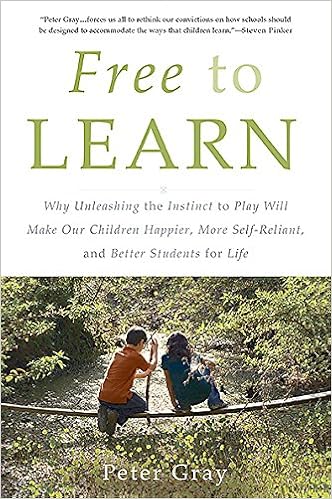Free to Learn by Peter Gray
Chapter 1 - What Have We Done to Childhood?
In this first chapter of Free to Learn, Peter Gray examines what childhood has been/should be and what, in many times, it has become. He contends that children are made for play - that unsupervised activity is the natural way children grow, develop, and learn. He says that we have created a totally supervised atmosphere for children in our current culture.
School - an unnatural setting for children - is totally supervised. Children are told what to learn and how to learn it. They are directed what to do throughout the day. They read what they did not choose and answer questions they did not generate. Even unstructured recess has been diminished or omitted.
After school they still do not get to explore on their own. Homework usurps time from free play. And more structured and adult-directed activities take the place of free play, too (organized sports, "resume building" activities, etc.).
Gray also notes that during the time that free play has been reduced, incidents of anxiety and depression in children and teens has increased. While it cannot be proved that there is a causal link between these two, it is interesting. Gray writes, "When people believe they have little or no control over their fate, they become anxious." Kids begin to see things beyond their control; they begin to think that their own efforts have little consequence on their lives.
Gray writes that free play (play that is chosen, directed, and controlled by the children themselves) helps children learn that they are not helpless. They take acceptable risks, make decisions, work cooperatively, resolve conflicts, create rules and adjust them too, negotiate, and develop competence. They discover what they enjoy and try different types of things through exploration and initiative. (A lot of this connects to what David Elkind wrote about game play.)
Two final key quotes---
- "Every time we reduce children's opportunities for free play by increasing their time at school or at other adult-directed activities, we reduce further their opportunities to learn to control their own lives, to learn that they are not simply victims of circumstances and powerful others."
- "Children do not need more schooling. They need less schooling and more freedom. They also need free access to the tools, ideas, and people (including playmates) that can help them along their own chosen paths."
I have seen that free play and exploration encourages more learning. I have seen young children grow in their understanding by pursuing their own ideas and investigating their own interests. I have gathered anecdotal information that this is better...or at least more engaging and meaningful.
But I didn't really realize that creating more adult-led activities and reducing child-led play was as potentially HARMFUL as Peter Gray notes.
A lot of what Gray writes connects with my other readings in the past year or so. I'll be interested to see how the rest of the book fits into my reading and my own thinking.



